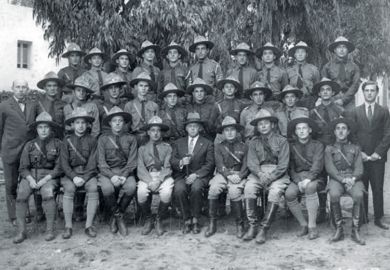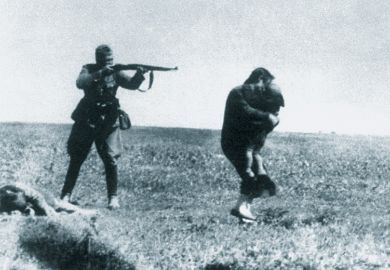To what extent were the Jewish communities of Europe responsible for the fate that befell them at the hands of the Nazi regime and its willing collaborators? An odd question, you might say. In large measure, you might answer, the Jews of France, the Low Countries, Poland, the Baltic states and so on were – surely – innocent victims of a killing machine that fate cruelly visited upon them.
In large measure, you would be right. But not in the case of Germany. In the case of Germany the Jews bore some responsibility for their own destruction. Specifically, their obsessive ultra-patriotism (Unser Deutschland) dulled their senses into not believing what they were seeing and blinded them to reality. Some did indeed leave in good time. Far too many left at the 59th minute of the eleventh hour, marked by the multiple pogroms of Kristallnacht, 9-10 November 1938. Some, incredibly, did not heed even this warning.
This story forms the backdrop to Professor Jay Geller’s compelling biography of the Scholem family of Berlin. The Scholem most remembered today is Gershom, who as a young scholar left Germany for Palestine in 1923, played a central part in the development of the Hebrew University of Jerusalem and established for himself a reputation as (still) the world’s foremost authority on Jewish mysticism, Kabbalah.
But in the inter-war years his reputation was rivalled by that of his Trotskyite-inspired brother Werner, who in 1921 became a Communist member of the Prussian Landtag and later (1924-8) sat as a Communist in the Reichstag. In 1925, in Weimar Germany’s first popular presidential election, and at Werner’s insistence, the Communists put up a candidate of their own (Ernst Thälmann), thus splitting the progressive vote and allowing Paul von Hindenburg to become the anti-republican president of Germany. Eight years later, at Hindenburg’s invitation, Hitler became German chancellor. In July 1940, Werner was executed in Buchenwald – perhaps at the instigation of vengeful Stalinist prisoners.
The Scholems made their money – of which there was never an over-abundance – as printers and lithographers. Two quarrelsome brothers of Werner and Gershon, Erich and Reinhold, managed the enterprise after the death of their father, but were inevitably squeezed out by Nazi racial laws. They found refuge in Australia, where they were joined by their mother Betty. The Scholems were not religious Jews, but took a certain pride in their German-Jewish identity which they hoped against hope that Nazism could be persuaded to accommodate. When the Nazis banned mixed marriages, we read that Betty “applauded the measure and commented that her brother Hans should be relieved that his daughter could not marry her Christian boyfriend”! We might note (though Geller does not) that this welcome was shared in religious circles, for example by Eli Munk, rabbi of Anspach and father-in-law of the future British chief rabbi Immanuel Jakobovits.
In writing the biography of the Scholem family, Geller has consulted a breathtaking array of sources on several continents and in several languages. As he reminds us, the intellectual Gershom did his best to replicate in Mandate Palestine the lifestyle to which he had aspired in Germany. A cultural rather than political Zionist, he is revered in Israel. In Germany there is no memorial in his honour.
Geoffrey Alderman is professor of politics at the University of Buckingham
The Scholems: A Story of the German Jewish Bourgeoisie from Emancipation to Destruction
By Jay Howard Geller
Cornell University Press, 344pp, £23.99
ISBN 9781501731563
Published 15 March 2019
Register to continue
Why register?
- Registration is free and only takes a moment
- Once registered, you can read 3 articles a month
- Sign up for our newsletter
Subscribe
Or subscribe for unlimited access to:
- Unlimited access to news, views, insights & reviews
- Digital editions
- Digital access to THE’s university and college rankings analysis
Already registered or a current subscriber?







